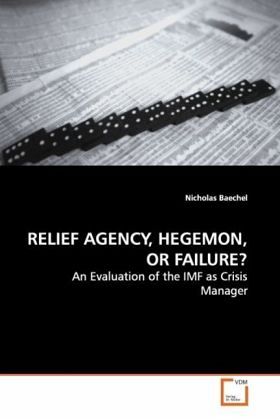
RELIEF AGENCY, HEGEMON, OR FAILURE?
An Evaluation of the IMF as Crisis Manager
Versandkostenfrei!
Versandfertig in 6-10 Tagen
32,99 €
inkl. MwSt.

PAYBACK Punkte
16 °P sammeln!
Using various sources, including the MeltzerCommission Report, Congressional testimony, and theworks of historians, economists, and social critics,this book will investigate and analyze the findingsand recommendations of the Meltzer Commission todetermine shortcomings in the IMF s response tovarious economic crises that have occurred since theabolishment of the gold standard. To accomplish thistask, this book will use two different methods ofanalysis. The first method will be a synchronicanalysis of the level of industrial development andeconomic infrastructure within countries thatexperienced...
Using various sources, including the Meltzer
Commission Report, Congressional testimony, and the
works of historians, economists, and social critics,
this book will investigate and analyze the findings
and recommendations of the Meltzer Commission to
determine shortcomings in the IMF s response to
various economic crises that have occurred since the
abolishment of the gold standard. To accomplish this
task, this book will use two different methods of
analysis. The first method will be a synchronic
analysis of the level of industrial development and
economic infrastructure within countries that
experienced economic crisis. The second method will
be a diachronic analysis of Japan s economic
infrastructure since 1800 to identify the factors
that enabled Japan to build a modern economy. The
goal is to remove the Western economic model that the
IMF uses to plan its response to economic crises and,
instead, create three distinct economic models of
recovery based on various stages of economic
development, using Japan s economic growth as a
foundation.
Commission Report, Congressional testimony, and the
works of historians, economists, and social critics,
this book will investigate and analyze the findings
and recommendations of the Meltzer Commission to
determine shortcomings in the IMF s response to
various economic crises that have occurred since the
abolishment of the gold standard. To accomplish this
task, this book will use two different methods of
analysis. The first method will be a synchronic
analysis of the level of industrial development and
economic infrastructure within countries that
experienced economic crisis. The second method will
be a diachronic analysis of Japan s economic
infrastructure since 1800 to identify the factors
that enabled Japan to build a modern economy. The
goal is to remove the Western economic model that the
IMF uses to plan its response to economic crises and,
instead, create three distinct economic models of
recovery based on various stages of economic
development, using Japan s economic growth as a
foundation.












